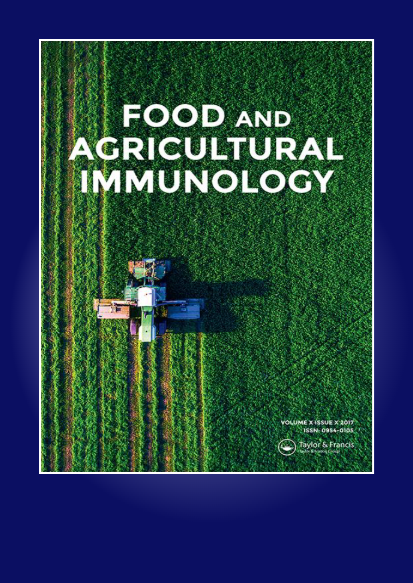木犀草素通过增加小鼠肺泡巨噬细胞HO-1和JAK-STAT的表达来减弱pm2.5诱导的炎症反应
IF 2.1
3区 农林科学
Q3 CHEMISTRY, APPLIED
引用次数: 2
摘要
摘要为了探讨环境PM2.5暴露诱导肺部炎症的相关机制和可能的治疗方法,本工作研究了木犀草素(一种广泛存在于多种植物中的天然类黄酮)在暴露于PM2.5的小鼠肺泡巨噬细胞MHS细胞中的活性。结果显示,PM2.5诱导了炎症反应,TNF-α、IL-6、MCP-1和Rantes水平显著升高。并诱导MH-S细胞中iNOS、COX-2和NF-κB蛋白的表达。此外,木犀草素预处理降低了PM2.5刺激的MH-S细胞中JAK2和STAT1蛋白的表达,但没有降低STAT3蛋白的表达。执行JAK2抑制剂AG490进一步显示TNF-α和IL-6的产生以及iNOS、COX-2和NF-κB蛋白的表达减少。此外,尽管PM2.5暴露基本上可以提高HO-1的表达,但木犀草素预处理和AG490给药进一步显著提高了HO-1的表现。总之,这些结果表明木犀草素通过抑制JAK2/STAT1/NF-κB通路和增强PM2.5激发的肺泡巨噬细胞MH-S细胞中HO-1的表达来抑制炎症。本文章由计算机程序翻译,如有差异,请以英文原文为准。
Luteolin attenuates PM2.5-induced inflammatory responses by augmenting HO-1 and JAK-STAT expression in murine alveolar macrophages
ABSTRACT
To explore the involved mechanisms and possible treatments of ambient PM2.5 exposure-induced lung inflammation, this work studied the activity of luteolin, a natural flavonoid which widely presents in many plant species, in murine alveolar macrophage MH S cells exposed to PM2.5. Results showed PM2.5 induced an inflammatory response, as evidenced by significantly increased TNF-α, IL-6, MCP-1 and Rantes levels. and induced iNOS, COX-2, and NF-κB protein expressions in MH-S cells. Moreover, luteolin pre-treatment reduced JAK2 and STAT1 but not STAT3 protein expressions in PM2.5-stimulated MH-S cells. Performing JAK2 inhibitor AG490 further showed reduced TNF-α and IL-6 productions as well as iNOS, COX-2, and NF-κB protein expressions. In addition, although PM2.5 exposure could elevate HO-1 expression basically, luteolin pre-treatment and AG490 administration further significantly enhanced HO-1 expression additionally. Collectively, these results revealed that luteolin inhibits inflammation through suppressing JAK2/STAT1/NF-κB pathway and enhancing HO-1 expression in PM2.5-challenged alveolar macrophage MH-S cells.
求助全文
通过发布文献求助,成功后即可免费获取论文全文。
去求助
来源期刊

Food and Agricultural Immunology
农林科学-毒理学
CiteScore
5.30
自引率
6.70%
发文量
52
审稿时长
2 months
期刊介绍:
Food and Agricultural Immunology is an international open access journal publishing original immunological research with applications in food, agricultural, environmental and veterinary science. Submissions describing the use of immunological techniques and methods are particularly welcomed.
The journal aims to expand our understanding of the interactions at the interface of food and immune systems including studies on:
-Development of diagnostic systems – all types of ligand-based assays, e.g. antibody, aptamer
-Application of ligand-based assays for the detection or identification of molecules of interest in food science, agricultural research, veterinary investigations and clinical systems relating to food allergy or sensitivity to agricultural chemicals
-Effects of food on the immune system
-Studies on allergy and allergic reactions
-Investigations into food allergies
-Development of allergen-free food systems
-Development of novel assay formats
-Applications of assay systems to the monitoring of food items in relation to safety and labelling
-Food quality issues, e.g. speciation, adulteration and contamination
-Comparisons between different analytical techniques
The journal publishes research and review articles and is essential reading for food scientists, immunologists and all those concerned with the interaction between food and immune systems.
 求助内容:
求助内容: 应助结果提醒方式:
应助结果提醒方式:


